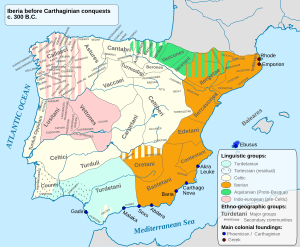Iacetani facts for kids
The Iacetani (say "Yah-seh-TAH-nee") were an ancient group of people. They lived in what is now northern Aragon, Spain, long before the Romans arrived. Their home was in the Pyrenees mountains and the nearby Ebro valley. Their main city was called Iaca, which today is the city of Jaca.
Ancient writers like Strabo said their land went from the Pyrenees all the way to Lleida and Huesca. Some historians think they might have been related to the Aquitanes, another ancient group. The Iacetani were known for making their own coins. They are also mentioned in old books by famous writers like Pliny the Elder and Ptolemy.
Contents
Who Were the Iacetani?
Historians aren't completely sure if the Iacetani were related to the Vascones, another group of people. The Iacetani lived in the high valley of the Aragon river. This area is now the northwestern part of Aragon.
The writer Strabo said the Iacetani were separate from the Vascones. But another Greek historian, Ptolemy, thought they were the same. Some ideas suggest they came from the Aquitanians. These Aquitanians might have crossed the Pyrenees mountains. They then settled on the southern side of the mountains with the Vascones. So, they could have been related groups, but not exactly the same people.
The Iacetani were a mountain people. To their south lived the Suessetani, who lived on the plains. The Iacetani from Iaca often raided and took things from the Suessetani.
Iacetani History and Roman Encounters
The Iacetani faced a big challenge from the Romans. In 195 BC, the Roman leader Cato the Elder attacked them. He captured their capital city, Iaca. The Suessetani helped the Romans in this fight. This help distracted the Iacetanian army.
After this defeat in the early 2nd century BC, the Iacetani are not mentioned much in old Roman writings. However, they kept making their own coins. These coins had the word "IACA" on them. This shows they were still around. Strabo also mentioned them between the 1st century BC and the early 1st century AD.
There are also stories that Julius Caesar met with the Iacetani. This happened during his campaigns to expand the Roman Empire. Caesar wrote that the Iacetani, along with other groups like the Ausetani, decided to support him. This happened after another Roman general, Decimus Brutus, won a big naval battle. Caesar's fame grew, and the Iacetani began sending messengers to him. They even agreed to supply him with grain.
Becoming Part of the Roman Empire
In 19 BC, the Iacetani's land became part of the Roman Empire. This happened after the Cantabrian Wars. They became "vassals" of Rome. This meant they were under Roman rule but didn't have full Roman citizenship. Their situation was not as good as some other groups in the region, like the Sedetani.
See also
 In Spanish: Jacetanos para niños
In Spanish: Jacetanos para niños
 | John T. Biggers |
 | Thomas Blackshear |
 | Mark Bradford |
 | Beverly Buchanan |


